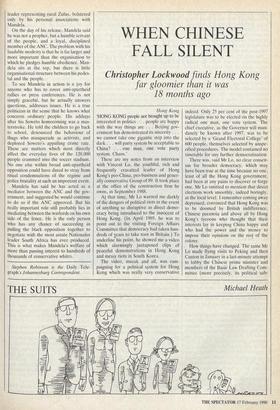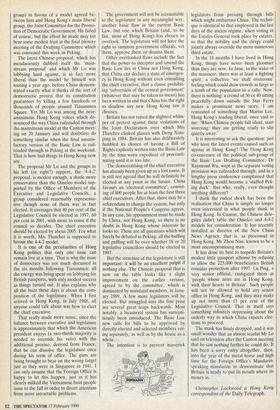WHEN CHINESE FALL SILENT
Christopher Lockwood finds Hong Kong
far gloomier than it was 18 months ago
'HONG KONG people not brought up to be interested in politics . people are happy with the way things are .• . Beijing gov- ernment has demonstrated its sincerity . . . we cannot take one gigantic step into the dark . . will party system he acceptable to China? . one man, one vote party system. Chaos.'
These are my notes from an interview with Vincent Lo, the youthful, rich and frequently cravatted leader of Hong Kong's pro-China, pro-business and gener- ally conservative Group of 89. It took place at the office of the construction firm he owns, in September 1988.
At that time, Mr Lo warned me darkly of the dangers of political riots in the event of anything so 'disruptive as direct demo- cracy being introduced to the innOcent of Hong Kong. '(In April 1989, he was to point out to the visiting Foreign Affairs Committee that democracy had taken hun- dreds of years to take root in Britain.) To underline his point, he showed me a video which alarmingly juxtaposed clips of peaceful demonstrations • in Hong.. Kong and messy riots- in South Korea,
The video, muzak and all, was cam- paigning for a political system for Hong Kong which was really very conservative indeed. Only 25 per cent of the post-1997 legislature was to be elected on the highly radical one man, one vote system. The chief executive, as the Governor will mun- danely be known after 1997, was to be selected by a 'Grand Electoral College' of 600 people, themselves selected by unspe- cified procedures. The model contained no timetable for any further democratisation.
There was, said Mr Lo, no clear consen- sus for broader democracy, Which may have been true at the time because no one, least of all the Hong . Kong government, had been at any pains to discover or forge one. Mr Lo omitted to mention that direct elections work smoothly, indeed boringly, at the local level. I remember coming away depressed, convinced that Hong Kong was to be doomed by British indifference, Chinese paranoia and above all by Hong Kong's tycoons who thought that their interests lay in keeping China happy and who had the power and the money to impose their opinions on the rest of the colony.
. How things have changed. The-same Mr Lo made flying visits to Peking and then Canton in January in a last-minute attempt to lobby the Chinese prime minister and members of the Basic Law Drafting Com- mittee (more precisely, its political sub-
group) in favour of a model agreed be- tween him and Hong Kong's main liberal group, the Joint Committee for the Promo- tion of Democratic Government. He failed of course, hut the effort he made may yet bear some modest fruit at the final plenary meeting of the Drafting Committee which was convened this week in Peking.
The latest Chinese proposal, which has mendaciously dubbed itself the 'main- stream proposal' and which Mr Lo was lobbying hard against, is in fact more liberal than the model he himself was touting a year ago, before China demons- trated exactly what it thinks of the sort of dernocractic protest that its constitution guarantees by killing a few hundreds or thousands of people around Tiananmen Square. Yet Mr Lo was among the near- unanimous Hong Kong voices which de- nounced the way China railroaded through the mainstream model at the Canton meet- ing on 20 January and will doubtless do something similar when the final unsatis- factory version of the Basic Law is rail- roaded through in Peking at the weekend. That is how bad things in Hong Kong now are.
The proposal Mr Lo and the groups to his left (or right?) support, the '4-4-2' proposal, is modest enough, a shade more conservative than the Omelco model sup- ported by the Office of Mcmbers of the Executive and Legislative Councils, a group considered reasonably representa- tive though none of them was in fact elected. It envisages that 40 per cent of the Legislative Council be elected in 1997, 60 per cent in 2001, with more to come if the council so decides. The chief executive should be elected by about 2005. For what it is worth, Mrs Thatcher is supposed to favour the 4-4-2 model.
It is one of the peculiarities of Hong Kong politics that only one issue can remain live at a time. That is why the issue of democracy was not much discussed in the six months following Tiananmen: all the energy was being spent on lobbying for British passports, with only modest success as things turned out. It also explains why all the buzz these days is about the com- position of the legislature. When I first arrived in Hong Kong, in July 1988, all anyone could talk about was how to elect the chief executive.
That really made more sense, since the balance between executive and legislature is approximately that which the American president enjoys (a two-thirds majority is needed to override his veto) with the additional proviso, derived from France, that he can dissolve the legislature once during his term of office. The guns are being brought to bear on the wrong target just as they were in Singapore in 1941. I can only assume that the Foreign Office is happy to let this happen, just as it has clearly milked the Vietnamese boat people issue to the full in order to divert attention from more intractable problems. The government will not be accountable to the legislature in any meaningful way, another basic flaw in the current Basic Law, but one which Britain (and, to be fair, most of Hong Kong) has chosen to overlook. The legislature will not have the right to summon government officials, vet them, approve them or dismiss them.
Other overlooked flaws include the fact that the power to interpret and amend the Basic Law lies in China not Hong Kong, that China can declare a state of emergen- cy in Hong Kong without even consulting the chief executive, that a clause prohibit- ing 'subversiOn of the central government' (whatever that may be taken to mean) has been written in and that China has the right to disallow any new Hong Kong law it chooses.
Britain has not raised the slightest whim- per of protest against these violations of the Joint Declaration over which Mrs Thatcher clinked glasses with Deng Xiao- ping in 1984. Britain has also deliberately fumbled its chance of having a Bill of Rights explicitly written into the Basic Law by the time-worn expedient of procrasti- nating until it is too late. The democratising of the chief executive has already been given up as a lost cause. It is still not agreed that he will definitely be elected at any point in the future. China favours an 'electoral committee', consist- ing of 800 people for at least the first three chief executives. After that, there may be a referendum to change the system, but only if the National People's Congress agrees. In any case, his appointment must be made by China, not Hong Kong, so there is no doubt in Hong Kong whose interests he looks to. These are all questions which will barely be debated in Peking: all the huffing and puffing will be over whether 18 or 20 legislative councillors should be elected in 1997.
But-the structure of the legislature is still important: it will be an excellent pulpit if nothing else. The Chinese proposal that is now on the table looks like a slight improvement on the earlier version, agreed to by the committee, which is dominated by mainland members, in Janu- ary 1989. A few more legislators will be elected. But smuggled into the fine print are several great leaps backwards. Most notably, a bicameral system has surrepti- tiously been introduced. The Basic Law now calls for bills to be approved by directly elected and selected members vot- ing separately, as well as by the house as a whole.
The intention is to prevent maverick legislators from pressing through bills which might embarrass China. The techni- que is identical to that employed in the last days of the ancien regime, when voting in the Estates-General took place by estates, So that the nobility and the clergy could jointly always override the more numerous third estate.
In the 18 months I have lived in Hong Kong, things have never been gloomier than they are now. In June, in the wake of the massacre, there was at least a fighting spirit, a collective 'we shall overcome' feeling which could draw crowds as large as a tenth of the population to a rally. Now, there is nothing: a crowd of 30 or 40 sitting peacefully down outside the Star Ferry makes a prominent news story. I am reminded of something that Martin Lee, Hong Kong's leading liberal, once said to me: 'When Chinese people fall silent, start worrying: they are getting ready to slip quietly away.'
It is interesting to ask the question: just why have the latest events caused such an uproar in Hong Kong? The Hong Kong co-convenor of the political sub-group of the Basic Law Drafting Committee, Dr Raymond Wu, wept as the separate voting provision was railroaded through, and in a lengthy press conference complained that Hong Kong would become a 'stuffed Pek- ing duck'. But who, really, ever thought anything different?
I think the rudest shock has been the realisation that China is simply no longer even interested in what people think in Hong Kong. In Canton, the Chinese dele- gates didn't table the Omelco and 4-4-2 models for consideration. It has recently installed as director of the New China News Agency, that is, as proconsul in Hong Kong, Mr Zhou Nan, known to be a most uncompromising man.
It has done its best to torpedo Britain's modest little passport scheme 'by refusing to allow the 225,000 beneficiaries British consular protection after 1997. Lu Ping, a very senior official, castigated them as 'people whose arses are in Hong Kong, with their hearts in Britain'. Such people will not be allowed to hold any senior office in Hong Kong, and they may make up not more than 15 per cent of the Legislative Council. That in itself says something infinitely depressing about the orderly way in which China expects elec- tions to Proceed.
The mask has finaly dropped, and it was small wonder that an almost tearful Mr Lo said on television after the Canton meeting that he saw nothing further he could do. It has been a sorry entry altogether, then, into the year of the metal horse and high time for the Foreign Office's Mandarin- speaking mandarins to demonstrate that Britain is ready to put its mouth where its money is.
Christopher Lockwood is Hong Kong correspondent of the Daily Telegraph.



















































 Previous page
Previous page